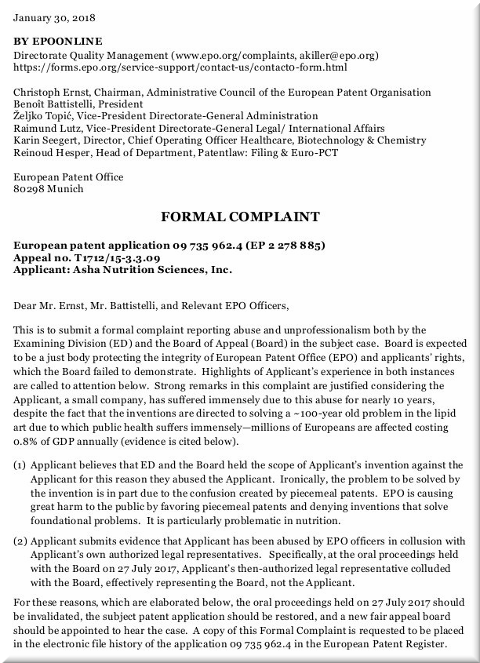

Formal Complaint (63 pages)
THE foundation to health is nutrition. The most important and difficult to manage nutrients consumed are lipids, which include omega-6, omega-3, and several antioxidants and phytochemicals. Most of the chronic diseases are associated with mismanaged lipid consumption, further immunity and daily well being is affected by lipid consumption, furthermore lipid requirements are different for different members of the family (by body size, hormones…). According to WHO statistics, 33% of Europeans above the age of 15 have a chronic disease (e.g., heart disease, diabetes, cancer, asthma, ADHD), a large part of which is associated with mismanaged lipid consumption including omega-6 and omega-3. Premature deaths of 550,000 workingââ¬âage people across European Union countries from chronic diseases cost EU economies EUR 115 billion or 0.8% of GDP annually.
"Board of Appeal disregarded the arguments and mounting evidence and issued a communication raising several far-fetched objections to Asha in April 2017."Natural lipid sources, oils, nuts and seeds etc, are variable and unreliable in lipid content and composition, and they contain many components that materially affect lipid metabolism. Adding to the complexity is mass confusion in the field with many spins on what is desirable and what is not. For example, many bodies and publications have disparaged omega-6 or taught low amounts of omega-6 and low omega-6 to omega-3 ratios, even though omega-6 is the most critical fatty acid for health. It is extremely complex for public to solve this problem. For example, less than 1% of public can correctly name types of fats/lipids. Unless corrected, the problem will continue to cost millions of lives and billions of Euros every year.
Deeply understanding the problem, a small company, Asha Nutrition Sciences, Inc. (Asha) set out to solve the problem by pre-formulating lipids for public health. As small companies depend on patents to finance efforts, Asha filed for European patents at EPO in 2010.
"There was a sinister collusion at the oral proceedings between the Board and Asha’s lawyer to undermine the applicant."EPO Examining Division issued many rejections under false pretenses, such as far-fetched clarity objections over terms such as “age of the subject”, and alleging blood lipid profile in a reference document anticipated applicant’s claims directed to lipid formulations for administration to subject. Asha patiently and diligently responded to all rejections, eventually, the case was appealed to EPO Boards of Appeal in July 2015, with long arguments and evidence. Board of Appeal disregarded the arguments and mounting evidence and issued a communication raising several far-fetched objections to Asha in April 2017. Asha responded to Board’s communication and appeared for oral proceedings with the Board on July 27, 2017, where the Board alleged “added matter” on the very claims that the skilled persons of Examining Division did not find added matter. Board inadvertently admitted that it relied upon “added matter” as an excuse to deny the patent.
There was a sinister collusion at the oral proceedings between the Board and Asha’s lawyer to undermine the applicant. There were five people in the room at the oral proceedings held on July 27, 2017. The Board (three men) with an agenda to deny patent because it would have solved many problems (unfavorable to EPO revenue), Asha's lawyer (one man) concerned about maintaining his relationship with EPO/Board and uninterested in solving the problem because that might adversely affect his other revenue streams (from other clients). The inventor/applicant was alone, ganged upon, and violated by the Board in collusion with applicant’s own lawyer.
"EPO is unethical, tyrannical, and exploitative."The manner in which EPO insists that applicants work through lawyers, combined with the manner in which EPO controls the lawyers practicing at EPO, essentially boils down to EPO exploiting small inventors in collusion with lawyers.
Lawyers are worried about their relationship with EPO, EPO is just concerned about fees that it collects (EPO is one of the few jurisdictions that requires annuity payments before patent grant, and the highest annuity fees), and EPO is the most unreasonable in that EPO denies restatements as “added matter”. Then EPO is just an unethical bottomline focused business that induces disclosure and denies rights, heedless to innovation. EPO is far from “strict”, strict implies following principles. No principles were followed at the oral proceedings of July 27, 2017. See Formal Complaint.
EPO is unethical, tyrannical, and exploitative. It functions as an oppressive 1920s governmental body, unbefitting of an organization whose charter is to spur innovation. ⬆